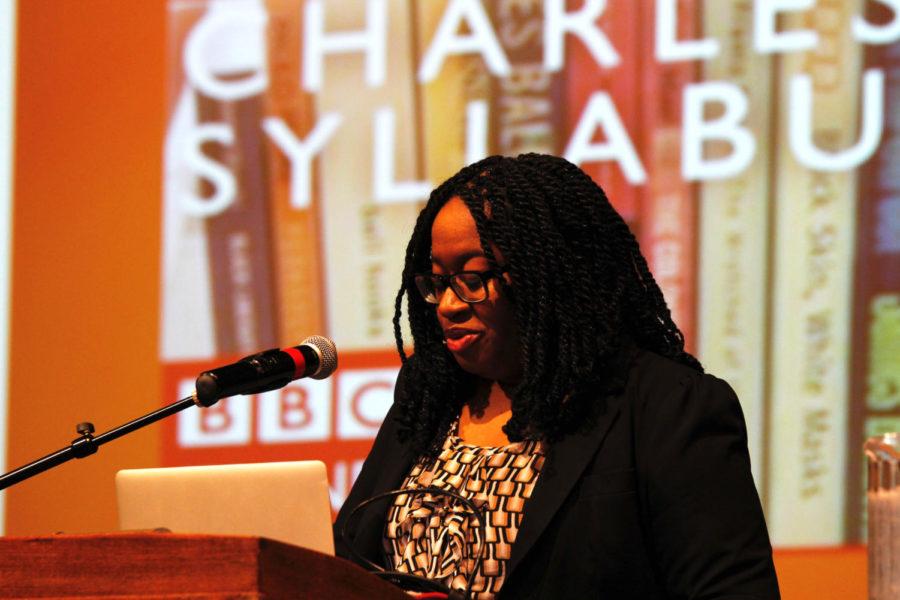Charleston Syllabus brings new awareness to old tragedies
On Monday, Feb. 20, the lecture In the Shadow of Charleston: Reflections on Race, Racism and Racial Violence, was held in the Memorial Union. The speaker for the lecture, Keisha Blain, is a visiting research scholar in the Department of Africana Studies at the University of Pennsylvania, and is the co-editor of The Charleston Syllabus: Readings on Race, Racism, and Racial Violence. Blain co-designed the collection to provide both historical and contemporary contexts for the 2016 shooting at a historic black church in Charleston, South Carolina.
February 20, 2017
Keisha Blain, history professor and co-author of “Charleston Syllabus,” opened her lecture Monday night in the Great Hall of the Memorial Union by giving a brief account of what happened the night of June 17, 2015, in Charleston, South Carolina.
Blain explained that Dylann Roof, the Charleston shooter, attended a bible study with 12 members and engaged in conversation with those in attendance before starting his rampage in what would become one of the worst acts of racial terror in the United States.
“You are raping our women and taking our country,” Blain said, re-enacting Roof’s explanation for his crime.
Blain said she was in disbelief and disillusionment over what had happened and realized change had to be done.
Scrolling through her Twitter feed, Blain noticed a tweet from Chad Williams, associate professor of African American studies at Brandeis University, that mentioned the hashtag, #CharlestonSyllabus.
“I contacted him and we began discussing the creation of the syllabus,” Blain said.
Blain pondered back and forth on the intentions of the syllabus. She wanted it to be a resource for those to become more educated when it came to race relations.
She also wanted to create something that would stir up national conversations about race.
“The hashtag has encouraged the shaping the conversation of race,” Blain said.
Within one hour, Blain saw the #CharlestonSyllabus hashtag trend on Twitter. She would later receive contacts from three librarians, who she kept unnamed, to assist with the future publication of the book.
“The three librarians helped me upload the first version of Charleston Syllabus on June 20, 2015,” Blain said.
The syllabus is a book full of recommendations of books that tackle race issues and their place in American society from the Civil War era to the Jim Crow and Civil Rights Movement. It also includes the histories of South Carolina and the city of Charleston.
“More than 100,000 people accessed the Charleston Syllabus’ list,” Blain said.
After the release of the book, it was met with praise and recognition.
Since the publication of the book, Blain has received many letters from readers thanking her, stating that the Charleston Syllabus has given them a new perspective on race.
“It brought people together from all walks of life,” Blain said.
But not all messages Blain has received have been positive.
“I got hate mail and was called the ‘n’ word,” Blain said.
When asked about how to deal with racial tension on campus, Blain advised a plan of more action than conversation.
“When we see a problem, we identify what must be changed, and we make action and we move from conversation.” Blain advised.
Blain also said that racist views are not a correct form of free speech and should not be tolerated.
“I think it’s problematic when we allow the flourishing of these ideas on a college campus,” Blain said.
Blain now finds herself refusing to accept misogynistic or racist views from anyone.
She believes her book has been effective in its mission.
“Those who read the book, it was transforming for them,” Blain said.
She also advised one action to take: form reading groups.
Blain discussed how one Missouri woman created a reading group based on the Charleston Syllabus and how it led to new perspectives for the woman and her reading group members.
“It is for the people who are willing and open,” Blain said.
Blain wrapped up her presentation by directing her final words to white students who consider themselves as allies.
“To be an ally is to be someone willing to listen,” Blain said.
Blain also encouraged those who claim to be allies to not become dictators but just listeners and stay open-minded.
“If you’re going to be doing this kind of work, you have to be dedicated,” Blain said. “Be willing to listen, be willing to learn and understand you’re always putting yourself on the line.”
















